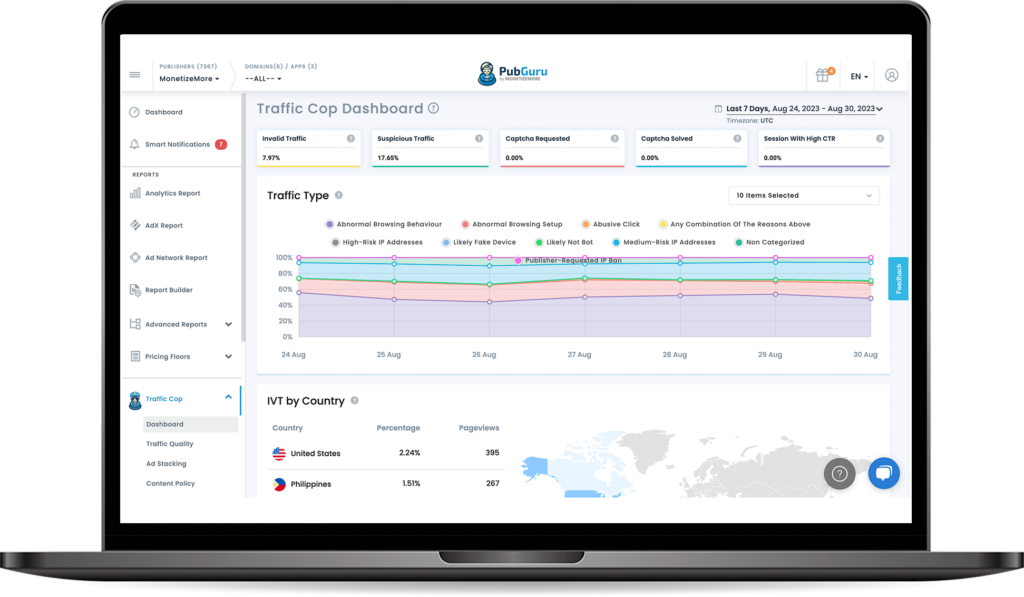
As we navigate through 2024, Adtech stands not merely as a component of digital marketing strategies but as the backbone that supports and drives them. As publishers, it’s important to understand what happens beneath the surface of programmatic AdTech. While your viewers only see the end product, the ads themselves, you the publisher must have a deeper knowledge of the digital advertising ecosystem to navigate its complexities when optimizing inventory.
In the illustration below the Interactive Advertising Bureau (IAB) has mapped out the entities and platforms that comprise the digital advertising ecosystem and how they interact.

This illustration gives us an overview of what happens behind the scenes of digital advertising. Because ad platforms are fast-evolving, publishers need to have a grasp of how they work.
From AI-driven predictive analytics to advanced programmatic advertising, the tools available today are not just enhancing existing strategies but are also paving the way for new, uncharted methods of audience engagement. Read on to find out what you can expect when it comes to AdTech advancements in 2024.

Google’s AI generative search is set to revolutionize how content is discovered and consumed. In 2024, publishers leveraging AdTech platforms can significantly boost their traffic through Google’s AI generative search by optimizing content and enhancing user personalization. AdTech platforms, equipped with AI capabilities, will play a crucial role in targeting and positioning ads more effectively, using predictive analytics for trend forecasting and real-time strategy adjustments.
By focusing on embracing programmatic advertising, and ensuring compliance with evolving privacy regulations, it’s time to align your content with Google’s advanced search algorithms. This strategic approach not only enhances visibility but also future-proofs publishers in an increasingly AI-driven online world.
Get ready to be captivated by the advent of AdOps AI. This cutting-edge technology promises to automate ad inventory optimization, offering unprecedented efficiency and effectiveness while boosting your ROI at the same time. Publishers and advertisers can expect a new era of precision and personalization, where AI algorithms analyze vast amounts of data in real-time to optimize ad performance.
The integration of AI in ad optimization will enable a hyper-targeted approach to audience segmentation. Advertisements will no longer just aim for broad demographics but will delve into nuanced user behaviors, preferences, and patterns.
Furthermore, AI-driven ad optimization will bring about real-time bidding and ad placement strategies that are unimaginably fast and accurate. By analyzing user engagement in milliseconds, AI will determine the best ad to display, at the perfect moment, on the most effective platform. This level of optimization ensures that every ad dollar is spent where it will have the most impact.
Real-time bidding (RTB) in the publisher’s marketplace is expected to undergo significant advancements, largely driven by the integration of AI and machine learning technologies. These advancements are set to redefine how publishers monetize their digital spaces, potentially leading to substantial increases in ad revenue:
Related Read: 13 Ad Tech Experts Discuss The Future of Adsense Alternatives
AI’s growing role in AdTech raises concerns around privacy, data security, and the potential for bias in automated decision-making. Here’s what you need to consider while navigating the ethical implications of AI in advertising technology:
How Publishers Can Prepare:
By proactively addressing these ethical considerations, you can not only avoid potential pitfalls but also build trust with your audience and partners, ensuring a sustainable and responsible approach to integrating AI in AdTech.
In 2024, ad fraud may continue to evolve, posing new challenges for publishers and advertisers alike. In 2023, statistics showed a concerning trend in bot traffic (over 85 billion dollars lost), with estimates indicating that a significant percentage of online ad interactions were not genuine human engagements. This trend, driven by increasingly sophisticated bots, poses a threat to the integrity of digital advertising and the efficacy of marketing budgets.
Looking ahead to 2024, experts predict a further escalation in bot sophistication, leading to an increase in ad fraud activities. These advanced bots are expected to mimic human behavior more accurately, making it challenging to differentiate between genuine and fraudulent traffic. As a result, the need for robust solutions to combat ad fraud has never been more critical.

One such solution gaining traction is Traffic Cop, a state-of-the-art tool designed to block invalid traffic effectively. Traffic Cop utilizes advanced algorithms and machine learning techniques to identify and filter out bot traffic in real-time. By analyzing patterns and behaviors that are indicative of bots, Traffic Cop ensures that ads are being viewed by real, engaged audiences, thereby protecting ad spend and maximizing ROI.
In addition to Traffic Cop, publishers are also advised to adopt a multi-layered approach to combat ad fraud. This includes regularly auditing traffic sources, implementing strict ad verification and viewability standards, and staying informed about the latest trends in ad fraud.
As we look towards the horizon of 2024, the future of adtech platforms is poised to be more innovative, impactful, and indispensable than ever before. This exciting journey into the future of digital advertising is marked by several key advancements that are reshaping the industry:
The advertising ecosystem can be overwhelming, but it’s up to publishers to concentrate on managing and optimizing inventory. Need a trusted Google Certified Publisher Partner to optimize your ad inventory for you? Sign up to MonetizeMore today!

With over ten years at the forefront of programmatic advertising, Aleesha Jacob is a renowned Ad-Tech expert, blending innovative strategies with cutting-edge technology. Her insights have reshaped programmatic advertising, leading to groundbreaking campaigns and 10X ROI increases for publishers and global brands. She believes in setting new standards in dynamic ad targeting and optimization.
10X your ad revenue with our award-winning solutions.